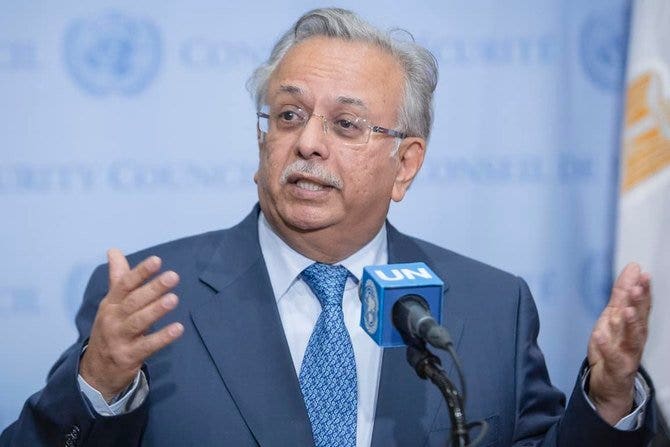At a recent United Nations conference to support Yemen, Saudi Arabia, which leads a military coalition backed by the internationally recognized Yemeni government, led by a total donation of $ 430 million of $ 1.67 billion raised.
Iran, which supports the Houthi militias fighting the Yemeni government, according to a public UN list of donations, offered no aid.
While the Biden government gave $ 191 million at the conference, adding to the hundreds of millions already donated to the war-torn country in U.S. humanitarian aid, a recent policy change and intense diplomacy to bring about a ceasefire dusver failed.
Attacks against the Saudi-led coalition by the Houthis have only increased in scope and ferocity.
The war began in 2014 when the Houthis besieged the Yemeni capital in an attempt to take over the country. In 2015, the Saudis led a coalition to fight the militias. Since then, the humanitarian situation has worsened, killing thousands of civilians and leaving millions on the brink of starvation.

Saudi Arabia’s Ambassador to the United Nations, Abdallah Y. Al-Mouallimi
(Credit Saudi Arabia mission to the United Nations)
Saudi Arabia’s UN ambassador, Abdallah Y. Al-Mouallimi, told Fox News that “Saudi Arabia has been among the best donor countries in the provision of humanitarian aid regionally and internationally, especially in Yemen.”
The ambassador noted the irony when it comes to Tehran’s destructive role in supporting the Houthis.
“On the other hand, Iran plays a devastating role in the region and provides funding, weapons and other support to a wide range of terrorist and rebel groups, including the Houthi militia.
“In addition, Iran is sending missiles to Saudi cities through the Iran-backed Houthis militia, including the recent escalation by the Iran-backed Houthis militia, attacks on oil facilities in eastern Saudi Arabia, the drone attack on the Ras Tanura port and attempted missile attack on an Aramco residential area targeted global energy supplies.
He warned that the attacks were not just affecting his country. “Ras Tanura is one of the world’s largest ports for oil transportation, and the Aramco complex in Dhahran houses workers and their families from around the world.”
He noted that the attacks “against the Kingdom” prove that these Iranian-backed militants only believe in terrorist behavior to achieve their narrow political goals. The Houthis continue to ignore and violate Security Council and international humanitarian law resolutions. . “
BLINKEN SS TRUMP-ERA ISRAELI PEACE OFFERS WAS A ‘VERY GOOD THING’
The Biden administration reaffirmed its policy last month by announcing an end in support of Saudi-led operations in Yemen.
Shortly afterwards, Foreign Minister Blinken revoked a Trump administration order by revoking the status of the Houthis of the Foreign Terrorist Organization, a decision he said was based on the serious humanitarian situation in the country and the fear of the impact this could have on basic consequences. commodities such as food and fuel.
Al-Mouallimi told Fox News that he understood the reasons for the delisting, but said: “Despite the US decision, Saudi Arabia will continue to treat Yemen’s Houthi as a terrorist organization.”
State Department spokesman Ned Price pushed back during Friday’s State Department briefing against a question from the Associated Press as to whether the delisting was a mistake. Price replied that “we are not going to apologize for doing everything in our power to address the important humanitarian distress of the people of Yemen.”
Price said the Trump administration’s last moment to add the Houthis to the terror list only exacerbated the problems in the region.
SYRIA’S BASHAR AL-ASSAD AND HIS WIFE TEST POSITIVE FOR CORONAVIRUS, OFFICE ANNOUNCEMENTS
But Varsha Koduvayur, a senior research analyst at the Foundation for Defense of Democracies (FDD), told Fox News that the Biden policy change “definitely contributed to encouraging the Houthis.”
“The spate of attacks has increased around the time the government has removed the Houthis from the government,” the Persian Gulf region expert said.
“The big prize for the Houthis is now the military offensive on Marib – they have little incentive to change tactics, and the setback of the government’s pressure, although it aims to benefit the humanitarian situation of Yemen, has decided the Houthi’s incentive structure. ”
POMPEO: TRUMP ADMINISTRATION SPEAKED ON FIRST AMERICA, AREA PRIORITIZES FANCY DEALS ON CLIMATE CHANGE
Meanwhile, the US special envoy for Yemen, Tim Lenderking, proposed a ceasefire avoided by the Houthis, who, according to Reuters, said the plan only represented the position of the UN and Saudi Arabia.
Lenderking spent about two weeks of diplomacy in the region to pursue the ceasefire.
While the Houthi offensive continues, Behnam Ben Taleblu, an Iran expert and senior fellow at FDD, warns that “Iran has resulted in a revolution in Houthi’s long-term strike capability” enabling the militias to seize Saudi oil assets and threaten infrastructure.
Iran has been able to avoid detection because of its ‘evolving distribution model (which means sending parts rather than complete systems’).
CLICK HERE TO GET THE FOX NEWS APP
Ben Taleblu said the Biden government needs to keep a close eye on these developments.
“Increasing strikes by the Houthis carry one message: that the rebels are confidential, that more material is on the way and will not be interrupted. Washington must prove them wrong,”
Fox News’ Adam Shaw contributed to the report, as did The Associated Press.
